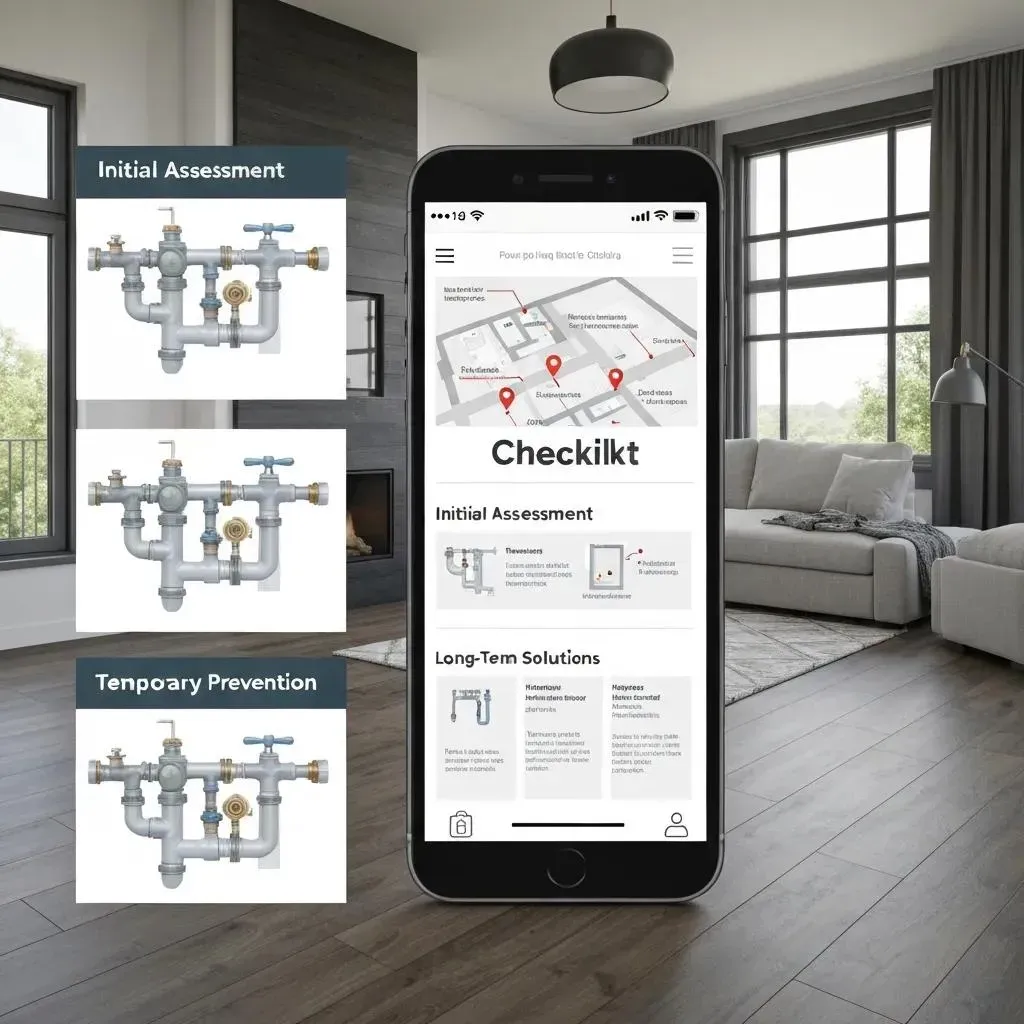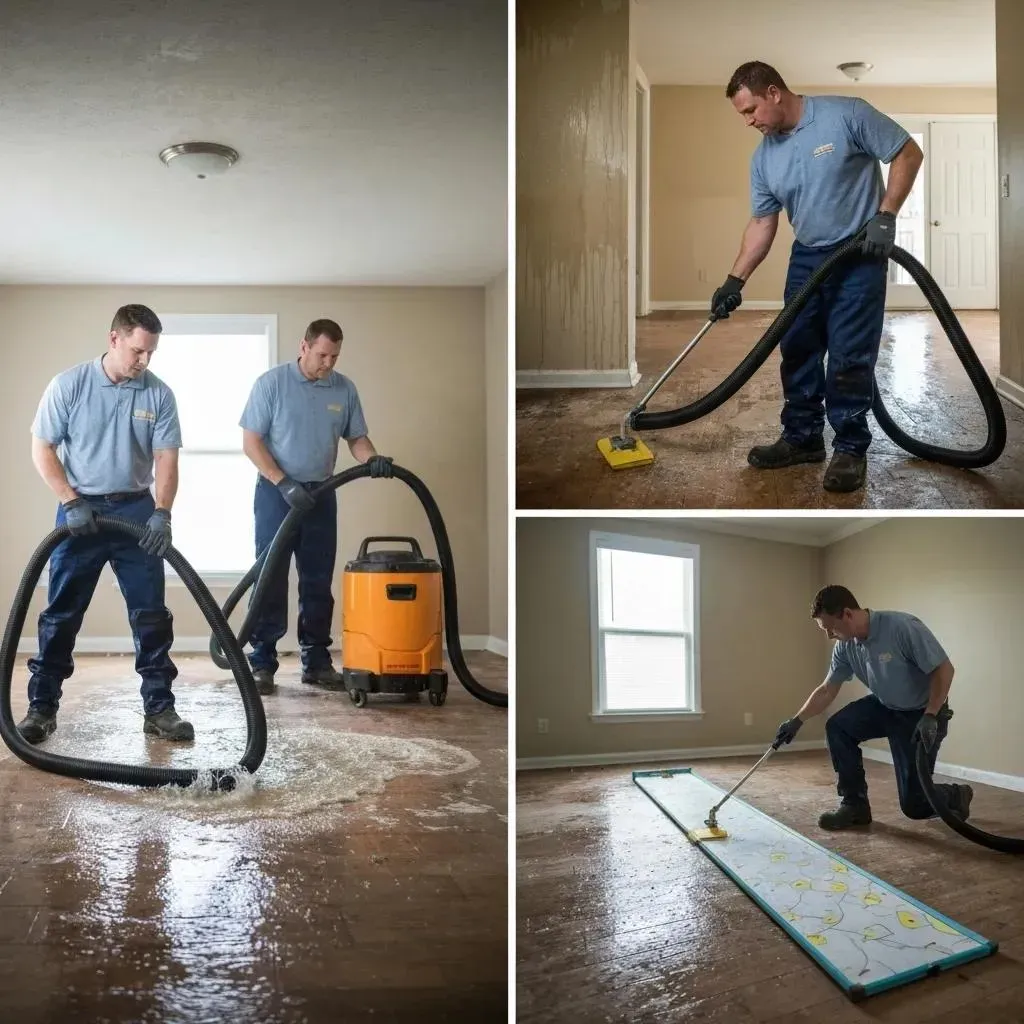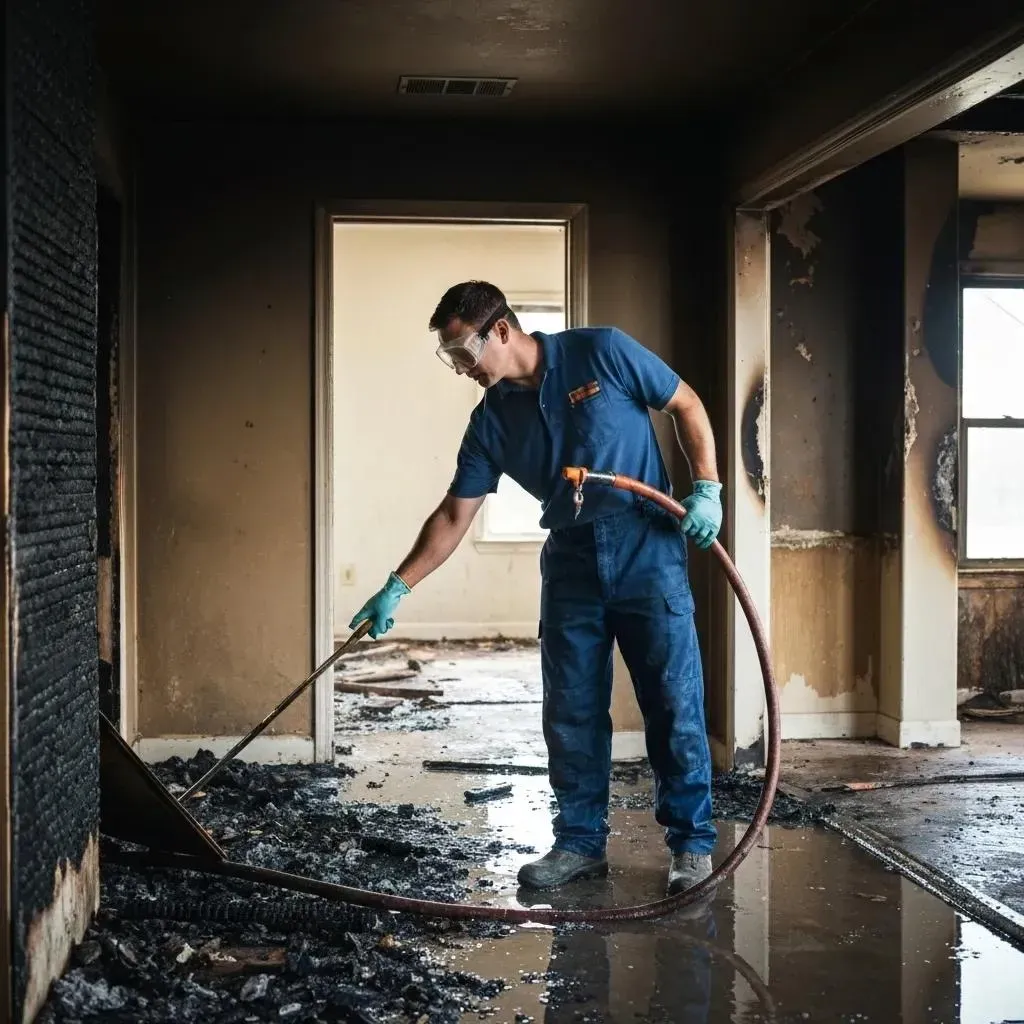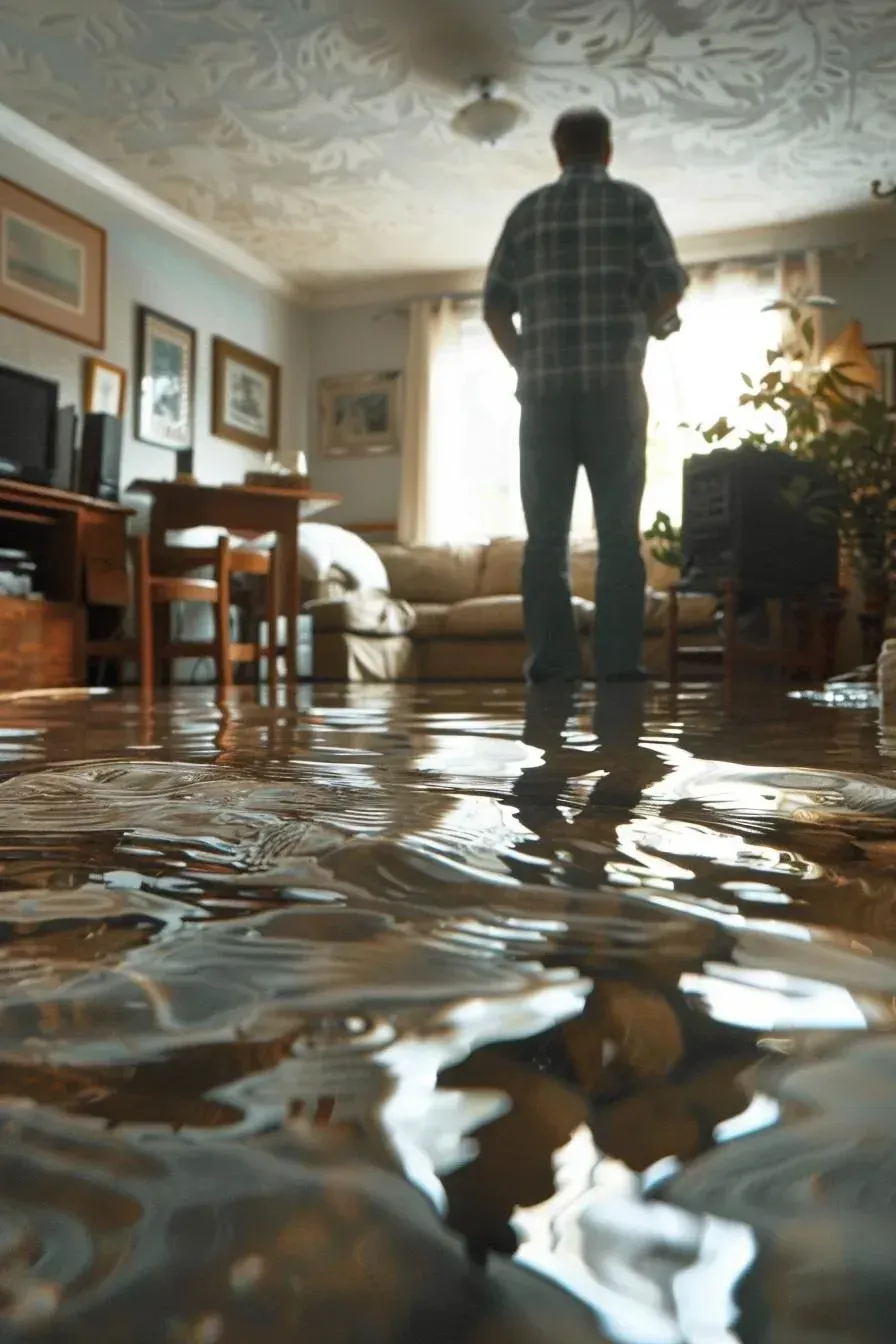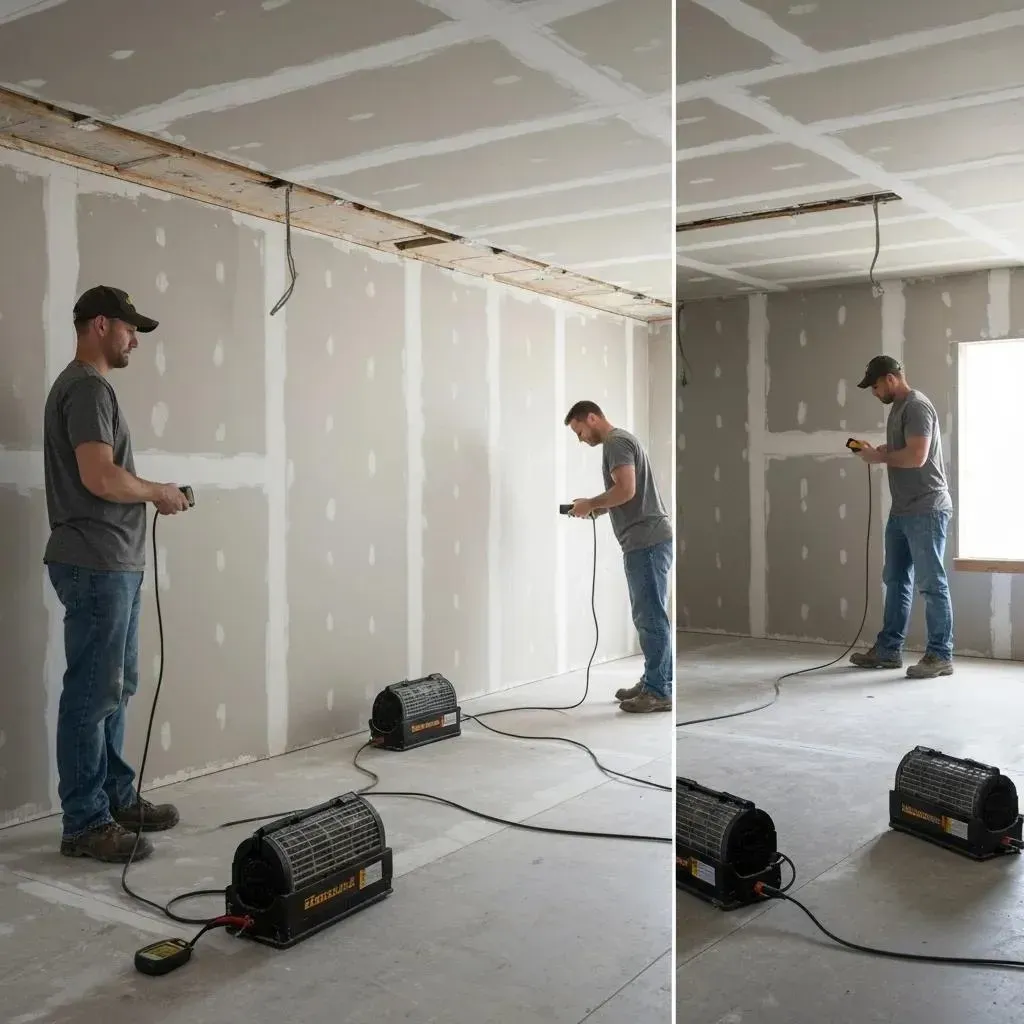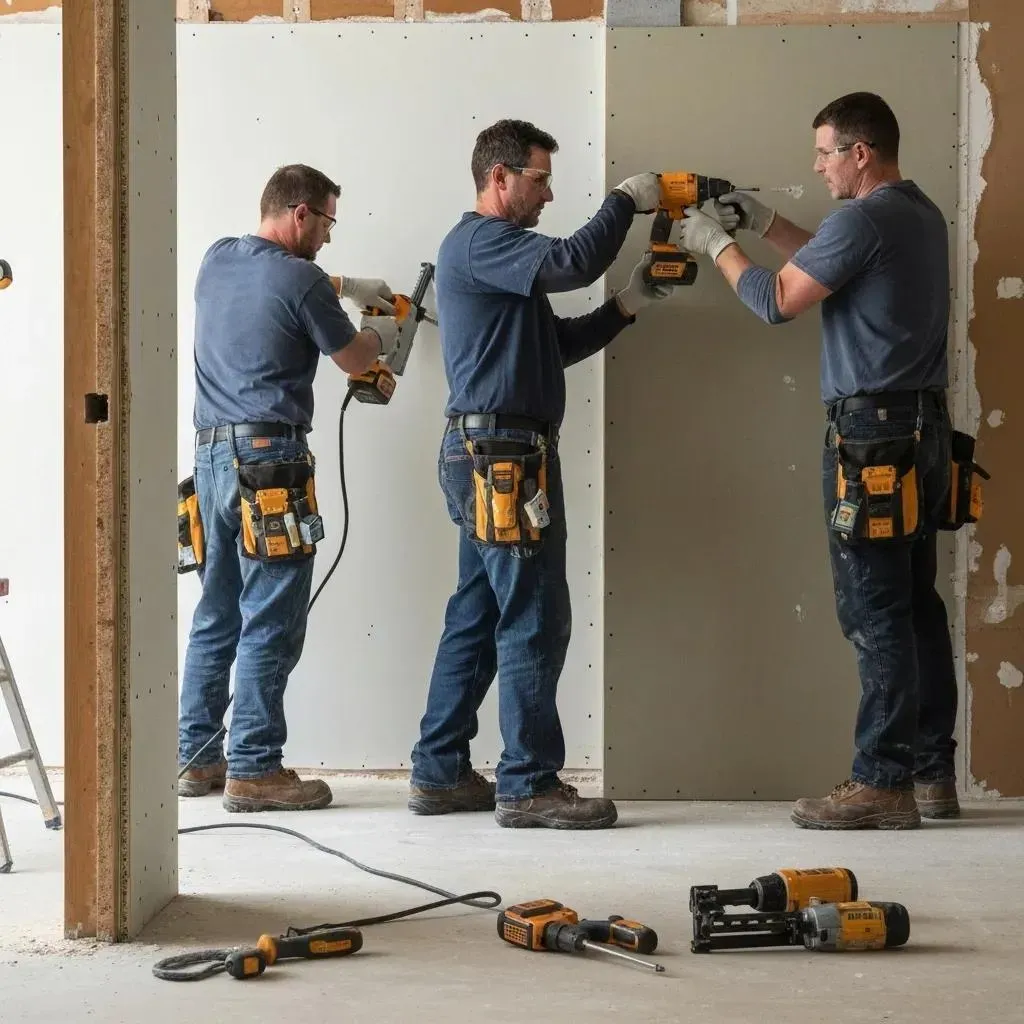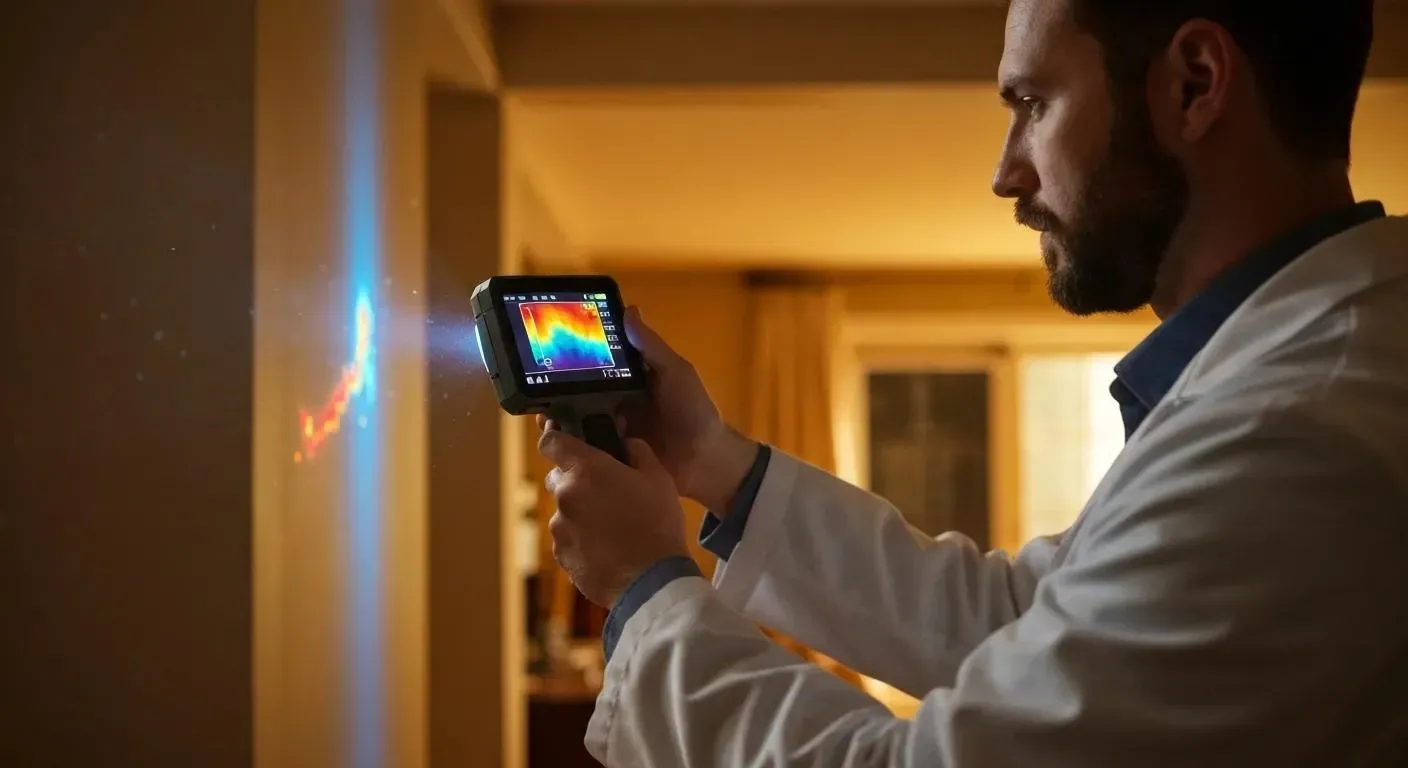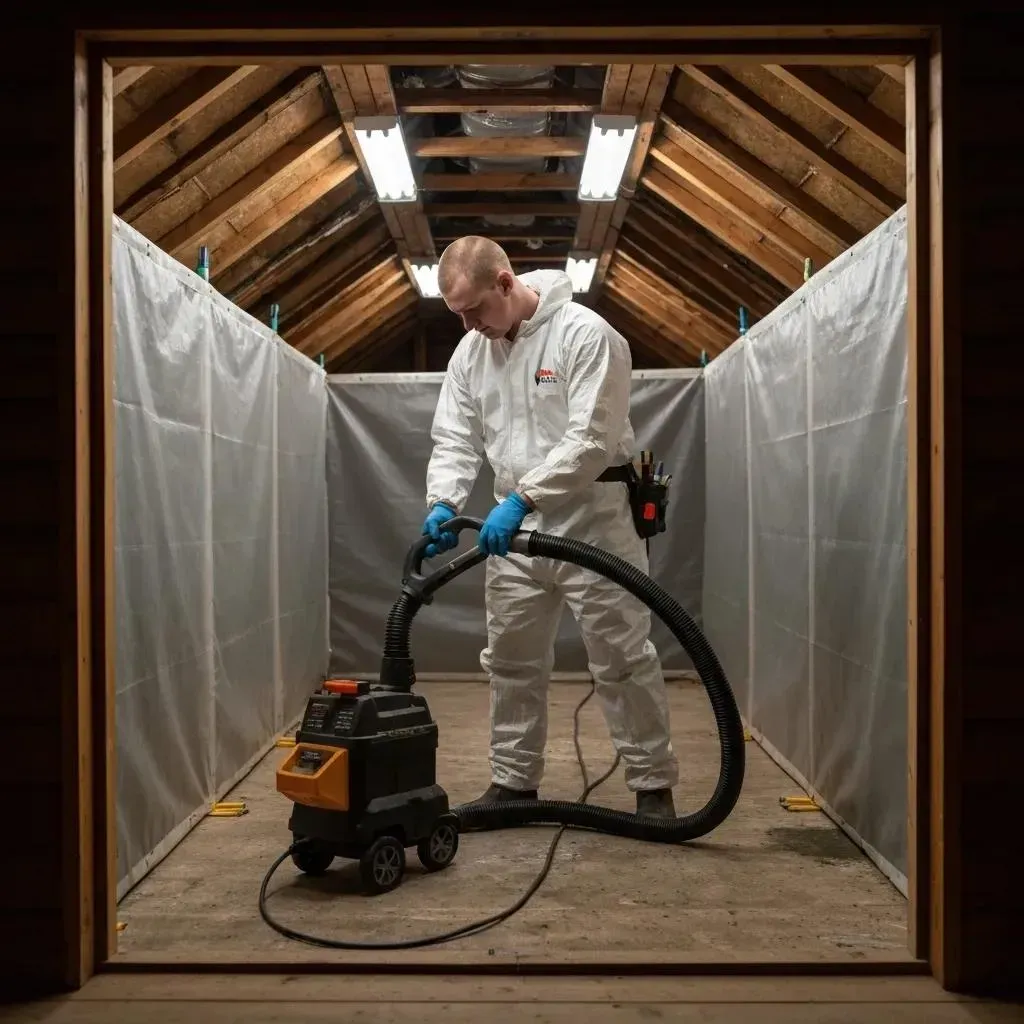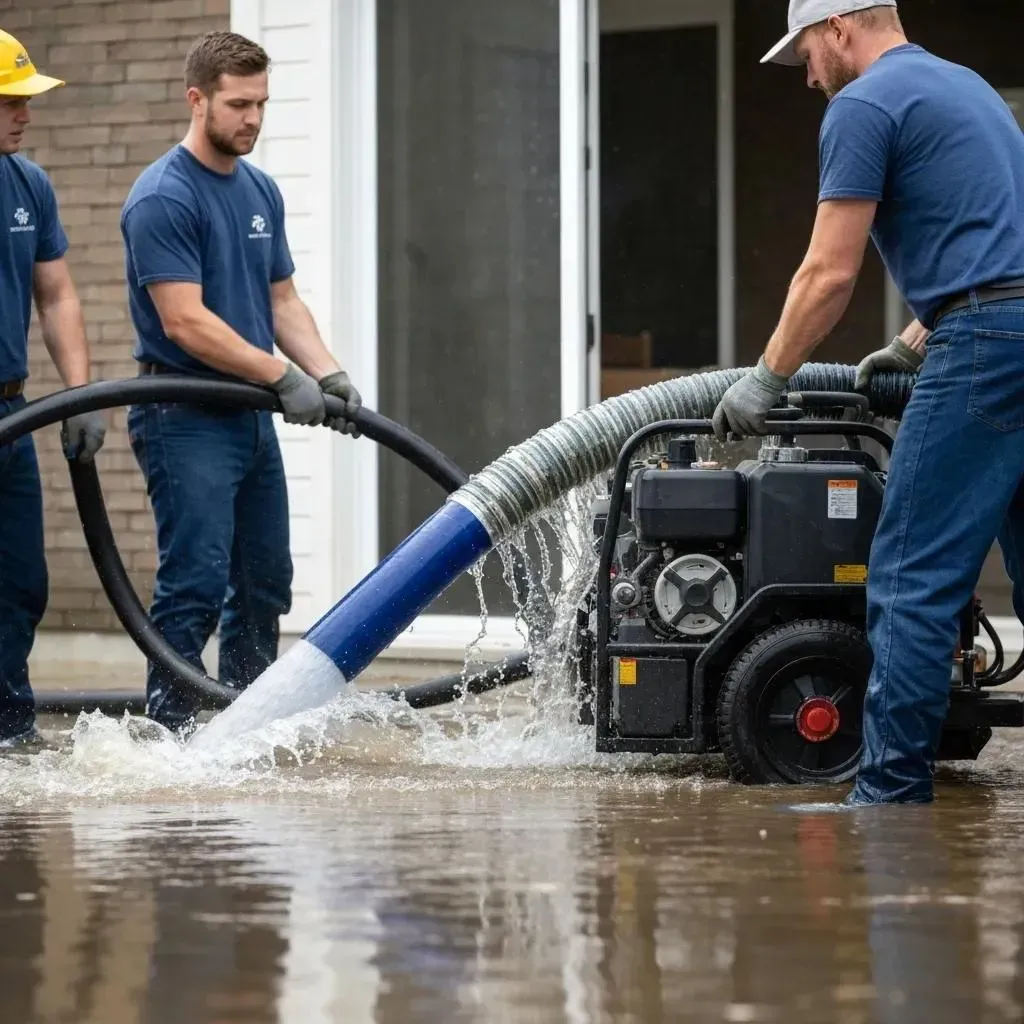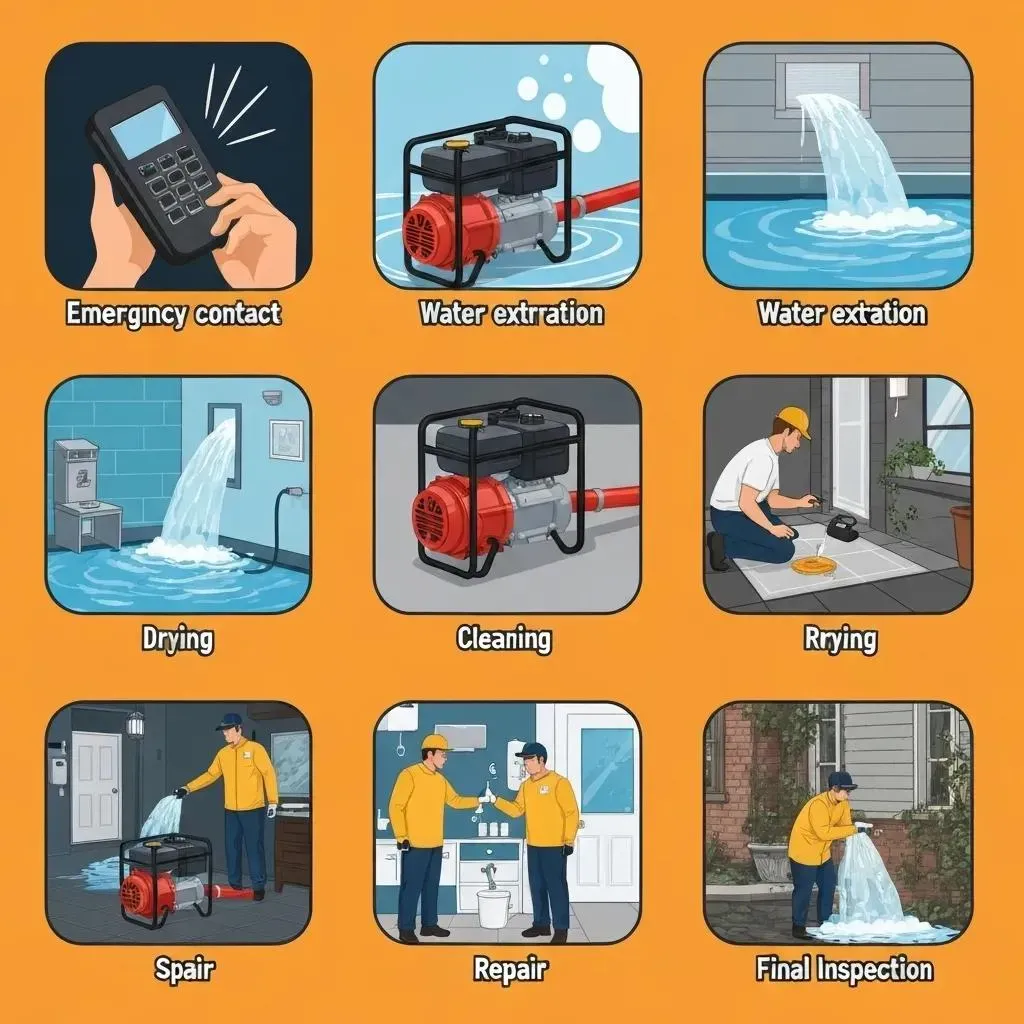Blog
Why Clean Up Services Are Essential When Disaster Strikes
Clean up services are professional teams that restore properties after damage from water, fire, mold, sewage, or traumatic events. These specialists use advanced equipment and safety protocols to remove hazards, sanitize spaces, and return homes to livable conditions.
Types of Clean Up Services:
• Emergency Response - Water damage, fire, sewage backups (24/7 availability)
• Specialized Remediation - Mold, asbestos, biohazard, crime scenes
• Property Restoration - Hoarding cleanup, foreclosure cleanouts, junk removal
• Routine Deep Cleaning - Move-out cleaning, post-construction cleanup
Life has a way of throwing curveballs when you least expect them. One Denver homeowner shared: "You never expect to have a pipe break in your basement while you are gone." Yet these emergencies happen daily across Colorado—burst pipes during freeze-thaw cycles, basement floods from spring snowmelt, and fire damage from electrical issues.
The stakes are high. Delaying professional cleanup can lead to:
- Mold growth within 24-48 hours
- Structural damage from prolonged moisture
- Health risks from bacteria and toxins
- Insurance claim denials for preventable secondary damage
Professional clean up services aren't just about removing water or debris. They're about protecting your family's health, preserving your property value, and restoring your peace of mind during life's most stressful moments.
I'm Mike Martinez, owner of Accountable Home Services, and I've helped hundreds of Denver-area families steer disaster recovery over the past decade. My team specializes in clean up services ranging from emergency water extraction to complete mold remediation, always prioritizing safety and compassionate care.
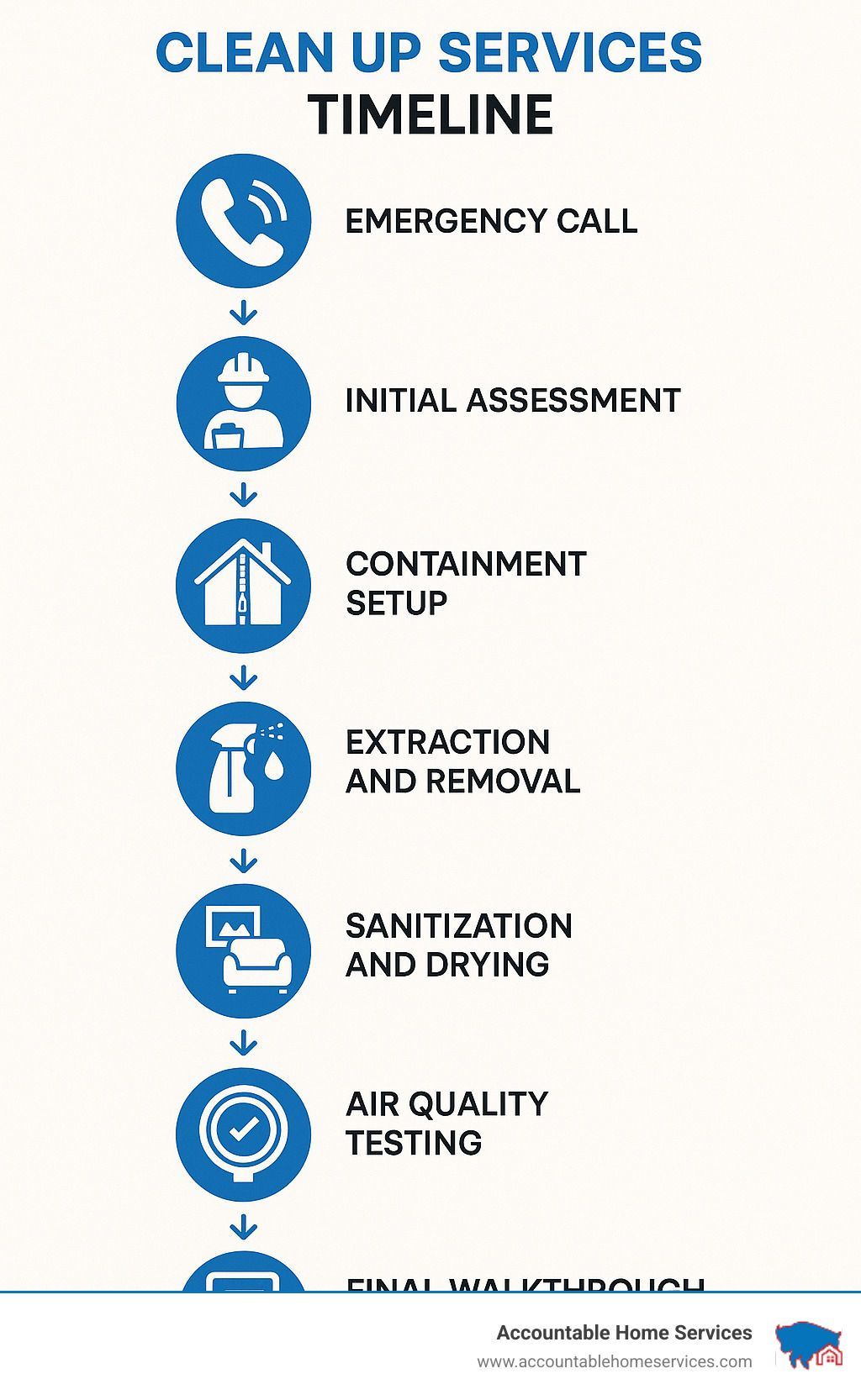
Understanding Clean Up Services: Types & Specialties
When you hear "cleaning," you might picture your weekly house tidying or scrubbing the kitchen after dinner. But clean up services represent something entirely different—specialized restoration work that requires professional expertise, advanced equipment, and strict safety protocols that no homeowner should tackle alone.
The world of professional clean up services splits into two distinct categories: residential and commercial. Residential services focus on homes, apartments, and small rental properties where families live and create memories. Commercial services handle everything from office buildings to industrial facilities, requiring different equipment scales and regulatory compliance. The techniques might be similar, but the scope and complexity can vary dramatically.
Think of clean up services as existing on a spectrum. On one end, you have straightforward junk removal—hauling away old furniture after an estate sale or clearing construction debris. These jobs primarily involve muscle, trucks, and basic sanitization. On the other end, you encounter complex biohazard situations requiring extensive certifications, specialized disposal methods, and protocols that protect both workers and future occupants.
Water damage restoration perfectly illustrates this complexity. Not all water damage is created equal. The industry categorizes water contamination into three levels: Category 1 (clean water from burst pipes), Category 2 (grey water from appliances), and Category 3 (black water from sewage). Each category demands increasingly strict safety measures and disposal procedures.
Standard equipment & products
Advanced equipment & protocols
Basic safety measures
Extensive PPE & certification
Same-day completion
Multi-day process with testing
Routine maintenance focus
Health & safety restoration
Minimal regulatory oversight
Strict compliance requirements
Core Categories of Clean Up Services
Routine cleaning services handle the everyday maintenance that keeps properties looking their best. This includes carpet cleaning, tile restoration, and those satisfying deep-cleaning projects that make a house feel fresh again. While homeowners could technically access similar cleaning products, professionals bring commercial-grade equipment and years of experience that deliver superior results.
Trash-out and cleanout services tackle the overwhelming job of removing large volumes of unwanted items. Picture a foreclosure property filled with abandoned belongings, or an elderly relative's home where decades of memories need careful sorting. The real skill isn't just hauling—it's identifying hidden valuables, coordinating donations for usable items, and properly disposing of materials that could be hazardous.
Water damage restoration represents one of the most time-sensitive categories in clean up services. When a pipe bursts in your basement, every hour counts. Fresh water damage might seem manageable, but mold can begin growing within 24-48 hours. Grey water from washing machines or dishwashers introduces contaminants that require improved safety protocols. Black water from sewage backups creates serious health hazards demanding specialized equipment and careful disposal procedures.
Fire and smoke damage cleanup involves challenges that extend far beyond removing charred debris. Smoke particles are incredibly small and penetrate porous materials like drywall, insulation, and fabrics. Soot is acidic and continues damaging surfaces until properly neutralized. Professional fire restoration includes content cleaning, odor elimination, and air quality restoration using HEPA filtration systems and specialized cleaning agents.
Mold remediation requires understanding the science behind moisture, spore behavior, and proper containment. That visible mold on your bathroom wall represents only part of the problem—airborne spores can spread throughout your entire property if disturbed incorrectly. Professional mold services use thermal imaging to locate hidden moisture sources, negative air machines to contain spores during removal, and antimicrobial treatments to prevent regrowth.
For comprehensive information about flood-related cleanup challenges and solutions, visit our Flood Damage Cleanup page.
Specialty Clean Up Services That Require Certified Pros
Biohazard cleanup encompasses any situation involving potential exposure to blood-borne pathogens, human waste, or chemical contamination. This includes crime scenes, unattended deaths, sewage spills, and homeless encampment cleanup. OSHA regulations mandate specific training, equipment, and disposal procedures that protect both workers and the public from serious health risks.
Crime scene and trauma cleanup requires not only technical expertise but extraordinary emotional sensitivity. Families dealing with tragedy need their property restored to a safe, habitable condition while processing grief and trauma. Professional trauma cleanup teams arrive in unmarked vehicles, work with complete discretion, and often provide referrals for counseling services to support families through difficult times.
Sewage backup cleanup presents serious health risks from bacteria, viruses, and parasites that thrive in raw sewage. These pathogens can cause severe illness through direct contact or airborne exposure during cleanup attempts. Professional sewage restoration involves complete removal of contaminated materials, thorough disinfection using hospital-grade products, and air quality restoration to ensure safe reoccupancy.
Chemical hazard cleanup includes specialized situations like methamphetamine lab remediation, where drug manufacturing has contaminated a property with toxic residues embedded in walls, flooring, and ventilation systems. These cleanups require extensive testing, decontamination procedures following state protocols, and final certification that the property meets health department standards for safe habitation.
Hoarding cleanup affects millions of Americans and requires a compassionate, non-judgmental approach that respects the individual's dignity while addressing serious safety concerns. Professional hoarding services carefully sort through belongings to recover valuables and sentimental items, coordinate donations and recycling for usable materials, and address underlying sanitation issues that often include pest infestations, structural damage, or biohazard conditions.
For scientific guidance on post-flood sanitation and safety protocols, the CDC provides detailed recommendations at their disaster cleanup resource page.
When to Call Professional Clean Up Services
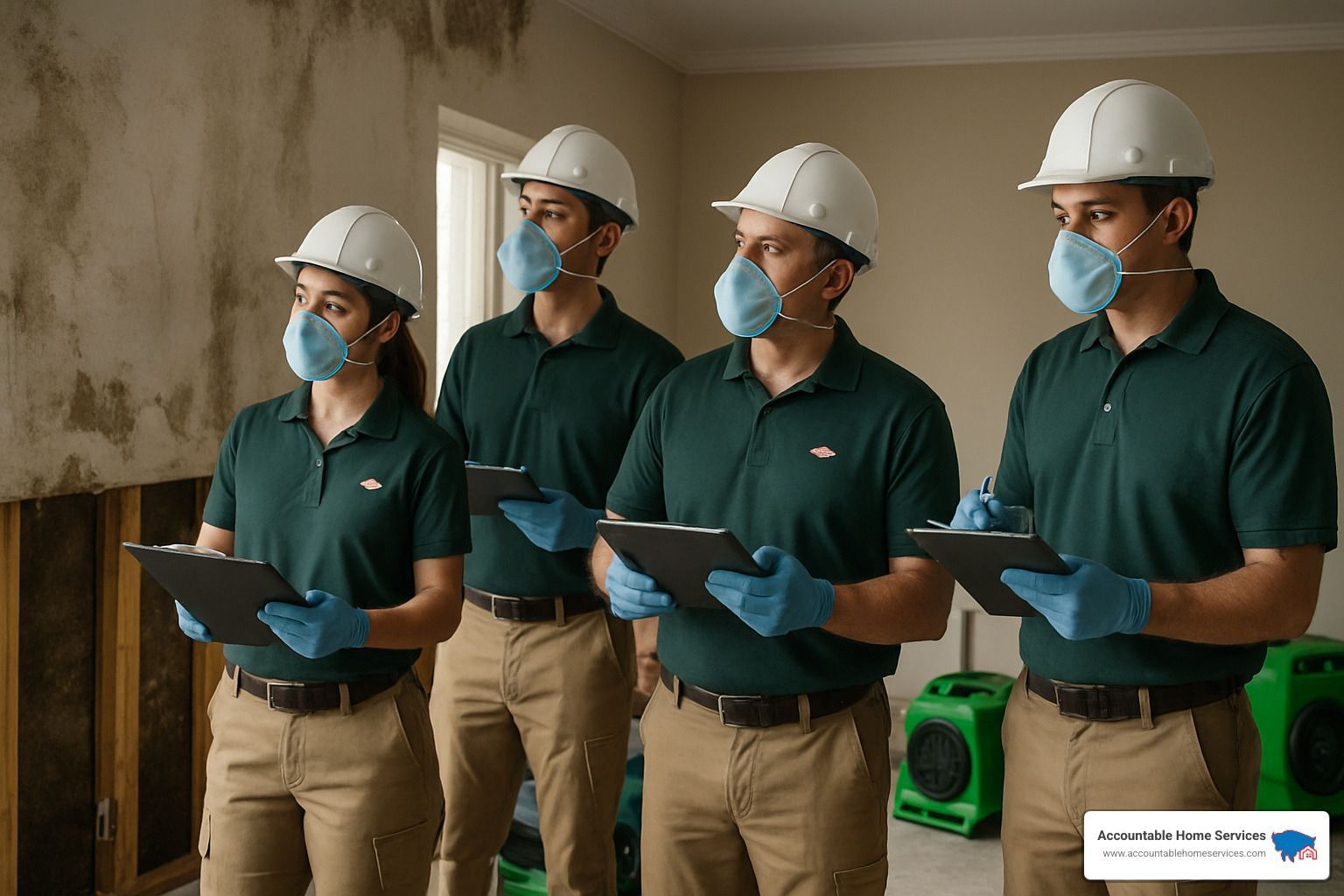
Picture this: you walk into your basement after a weekend away and find yourself ankle-deep in murky water from a burst pipe. Or maybe you wake up to the acrid smell of smoke lingering in your home days after a small kitchen fire. These moments hit like a punch to the gut, and your first instinct might be to grab some towels and tackle the mess yourself.
But here's the truth—some situations are simply beyond what any homeowner should handle alone. Knowing when to call clean up services can literally save your home, your health, and your sanity.
Water emergencies top the list of situations that demand immediate professional attention. When one Denver family returned from vacation to find their basement flooded with 30-40 inches of water, they quickly realized their shop vacuum and household fans weren't going to cut it. Standing water requires industrial-grade pumps and commercial dehumidifiers to extract moisture from porous materials like drywall, subfloors, and insulation before mold takes hold.
Fire damage doesn't end when the flames are out. Smoke and soot continue their destructive work through acidic chemical reactions that eat away at surfaces. Even a small kitchen fire can leave invisible damage throughout your home, requiring specialized equipment to neutralize odors and remove particles that standard cleaning can't touch.
Sewage backups create immediate health hazards that no homeowner should face without proper protection. The bacteria, viruses, and parasites in raw sewage can cause serious illness through contact or even airborne exposure. Professional teams arrive with hazmat suits and specialized disposal protocols that keep your family safe.
Mold findies often reveal just the tip of the iceberg. That black spot behind your washing machine might indicate hidden moisture problems affecting your home's structure. Attempting to clean visible mold without proper containment can actually spread spores throughout your property, making a small problem much worse.
Here are the red flag signs that mean it's time to call the professionals: standing water you can't remove with household equipment, any sewage backup, visible mold growth larger than 10 square feet, persistent musty odors indicating hidden moisture, fire or smoke damage of any size, chemical spills or unknown substances, situations involving human or animal waste, and hoarding conditions creating safety hazards.
Emergencies vs Planned Projects
Not every cleanup situation requires sirens and flashing lights, but true emergencies don't wait for convenient business hours. Emergency clean up services operate around the clock because disasters certainly don't check your calendar before striking.
When Denver homeowners face water emergencies, our teams typically arrive within 2-4 hours of that first panicked phone call. Fire damage gets same-day response because every hour counts when it comes to preventing permanent odor absorption and surface damage. Biohazard situations receive immediate priority—because your family's health can't wait until Monday morning.
Denver's unique climate creates some predictable patterns that smart homeowners watch for. Our dramatic temperature swings—sometimes 30°F in a single day—stress plumbing systems and building materials beyond their limits. Spring snowmelt and those intense summer thunderstorms regularly flood basements across the metro area. Winter freeze-thaw cycles are notorious pipe-bursters that keep our emergency crews busy from December through March.
Insurance deadlines often drive the urgency more than homeowners realize. Most policies require prompt notification and immediate action to prevent additional damage. Waiting a few days to "think about it" can void coverage for secondary damage like mold growth or structural problems that develop from delayed response.
For immediate water emergencies that can't wait, learn more about our Emergency Water Extraction Services.
DIY Limits & Hidden Dangers of Delaying Clean Up Services
There's something admirable about the DIY spirit—until it puts your family at risk or costs you thousands in preventable damage. Understanding the limits of what you can safely handle yourself isn't about admitting defeat; it's about making smart decisions that protect what matters most.
Structural integrity issues hide beneath the surface in water damage situations. While you might successfully mop up visible water, moisture penetrating wall cavities, subfloors, and insulation continues its destructive work until properly dried with commercial equipment. What looks like successful cleanup on the surface can lead to rotting floor joists and crumbling drywall months later.
Health risks escalate quickly in contaminated environments. Sewage contains pathogens that cause serious illness, while disturbed mold spores trigger respiratory problems and allergic reactions. Professional cleanup teams don't just have better equipment—they have the training and protective gear to work safely in hazardous conditions.
Insurance complications frequently blindside homeowners who attempt DIY cleanup. Policies typically require "prompt" professional action to mitigate damage. When your well-intentioned cleanup efforts fail to prevent mold growth or structural damage, insurance companies may deny claims for these "preventable secondary losses."
The emotional toll of tackling overwhelming cleanup projects can devastate families already dealing with loss and stress. Professional services provide more than technical expertise—they offer hope and support during your darkest moments. Many cleanup companies train their technicians in compassionate communication and maintain referral networks for counseling services.
The EPA provides comprehensive guidance for homeowners dealing with flood damage at EPA Natural Disasters, emphasizing the importance of professional assessment for significant damage. When in doubt, their advice echoes what we tell every client: it's better to have professionals evaluate the situation than to find months later that DIY efforts weren't enough.
The Clean Up Service Process: From Assessment to Aftercare
When disaster strikes your Denver home, professional clean up services don't just show up and start working. There's a carefully orchestrated process that ensures your safety, protects your belongings, and delivers complete restoration. Understanding what happens from that first phone call to the final walkthrough helps you feel more confident during an already stressful time.
The journey begins with a thorough site inspection where certified technicians assess every aspect of the damage. They're not just looking at what's obviously broken—they use thermal imaging cameras to spot hidden moisture behind walls, moisture meters to check subflooring, and air sampling devices to test for contamination. This isn't guesswork; it's science-based assessment that creates the roadmap for your restoration.
During this inspection, we document everything with detailed photos and measurements. This documentation serves two crucial purposes: it helps your insurance claim process run smoothly, and it gives us baseline readings to track our progress. When we say your home is fully restored, we have the data to prove it.
The work authorization phase is where transparency matters most. You'll receive a detailed scope of work that explains each step, timeline estimates, and cost projections. We believe in no surprises—you should understand exactly what we're doing and why before we begin. This written authorization protects both of us and ensures we're all working toward the same goal.
Once work begins, containment setup becomes our first priority. Think of it as creating a protective bubble around the damaged area. We use physical barriers, negative air machines, and protective coverings to prevent contamination from spreading to clean areas of your home. This step is especially critical for mold remediation and biohazard situations where cross-contamination could create bigger problems.
The removal and disinfection phases vary dramatically depending on what we're dealing with. Water extraction might involve truck-mounted pumps removing thousands of gallons, while fire damage cleanup requires specialized cleaning agents to neutralize acidic smoke residues. Every situation demands its own approach, but the goal remains the same: eliminate the source of contamination and create a clean foundation for restoration.
Drying and deodorizing often takes the longest time but represents the most critical phase. Industrial dehumidifiers, air movers, and heat drying systems work around the clock to remove moisture from building materials. We're not just drying surfaces—we're pulling moisture from inside wall cavities, subflooring, and insulation where it loves to hide and cause future problems.
Throughout this process, we're working to salvage and clean your belongings whenever possible. Professional content cleaning can often restore furniture, electronics, documents, and sentimental items that initially appear beyond hope. Sometimes the emotional value of saving a family heirloom far exceeds the cost of the service itself.
The final step involves verification testing to confirm that restoration meets industry standards. We take final moisture readings, conduct air quality tests, and perform visual inspections to ensure your home is truly safe for reoccupancy. Many of our clients receive certificates of completion for their insurance files and their own peace of mind.
Step-By-Step Walkthrough of a Typical Water/Sewage Job
Let me walk you through what happens when we respond to a basement flood or sewage backup—two of the most common emergency calls we receive in the Denver area.
Before our technicians even enter the contaminated area, they suit up in full protective equipment. This includes protective suits, respirators, gloves, and boot covers. It might look like overkill, but sewage contains dangerous pathogens that can cause serious illness. Proper PPE protects our team and prevents them from accidentally spreading contamination to clean areas of your home.
Water extraction starts immediately using truck-mounted or portable pumps capable of removing thousands of gallons per hour. That basement with 30-40 inches of standing water? We can typically extract it within a few hours, though commercial properties might require days of continuous pumping. Speed matters here—every hour of delay increases the risk of structural damage and mold growth.
Next comes debris removal of materials that can't be salvaged. Sewage-contaminated drywall, insulation, and flooring must go. This step often reveals hidden damage that wasn't visible during the initial assessment—rotted subflooring, damaged electrical systems, or compromised structural elements that need attention.
While we're removing debris, HEPA filtration systems run continuously to capture airborne contaminants. These machines create negative pressure that acts like a vacuum, preventing contaminated air from spreading throughout your home. You'll hear them humming in the background—that's the sound of protection.
Antimicrobial treatment follows using EPA-registered disinfectants applied through spraying, fogging, or direct application depending on what we're treating. This isn't household bleach—these are hospital-grade chemicals specifically designed to eliminate bacteria, viruses, and other pathogens found in contaminated water.
Moisture monitoring continues throughout the drying process using calibrated meters and data logging equipment. Professional drying typically takes 3-5 days but can extend longer for severe damage or during Denver's humid summer months. We're not guessing when it's dry—we're measuring until readings meet industry standards.
The final clearance testing verifies that moisture levels are appropriate before any reconstruction begins. This step prevents future mold growth and ensures your restoration will last for years to come.
For detailed information about sewage-specific cleanup protocols, visit our Sewage Spill Cleanup page.
Specialized Protocols for Biohazard & Trauma Clean Up Services
Biohazard and trauma clean up services operate under entirely different rules than standard restoration work. These situations involve potential exposure to blood-borne pathogens, requiring strict compliance with OSHA regulation 29 CFR 1910.1030. Our technicians maintain specialized training and certification specifically for these sensitive situations.
Blood-borne pathogen protocols require complete removal of all contaminated materials, not just cleaning. Carpet, padding, subflooring, drywall—anything that can't be thoroughly disinfected gets removed and disposed of through licensed medical waste facilities. We then treat all remaining surfaces with hospital-grade disinfectants and restore air quality using specialized filtration.
When law enforcement releases a crime scene, chain of custody procedures ensure we handle any remaining evidence properly. We coordinate closely with investigators to preserve anything important while beginning the restoration process. This delicate balance requires experience and clear communication with all parties involved.
Discreet service delivery matters enormously during trauma cleanup. We use unmarked vehicles and minimize external equipment to protect your family's privacy during an already difficult time. Many of these cleanups happen during off-peak hours to reduce neighborhood attention and give families space to grieve.
Beyond the technical work, we often provide counseling referrals to connect families with mental health resources. Trauma recovery involves more than just cleaning—it requires emotional support that goes beyond our expertise. We maintain relationships with grief counselors, victim advocates, and support groups throughout the Denver area.
The CDC provides comprehensive guidance on food and water safety after disasters at CDC Food and Water Safety, emphasizing their key principle: "when in doubt, throw it out."
Safety, Compliance & Credentials That Matter
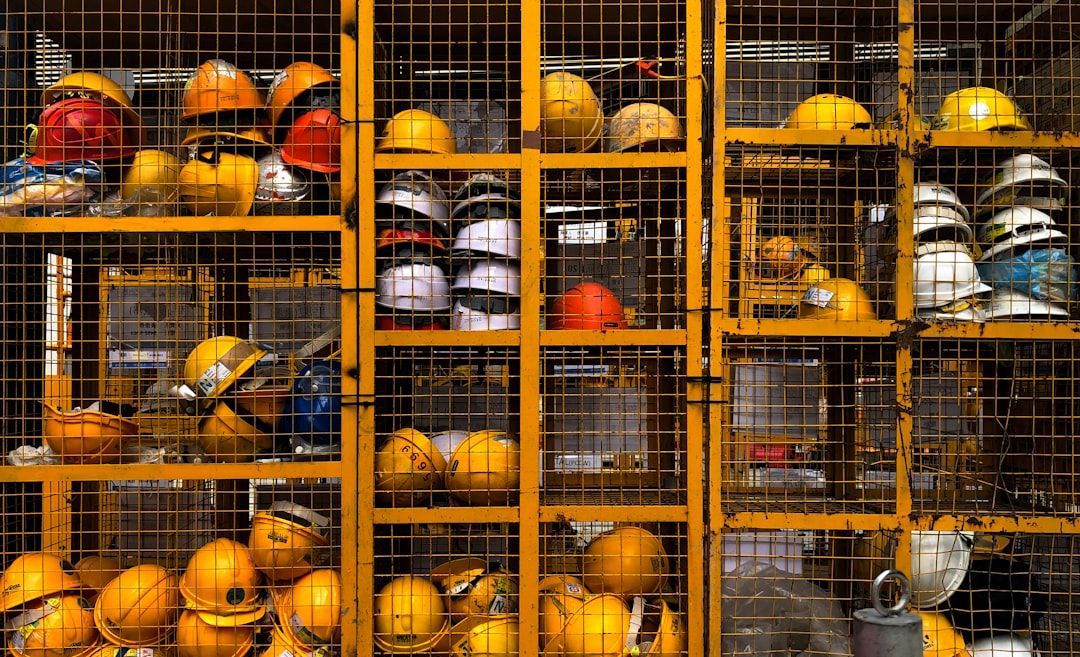
When disaster strikes your home, the last thing you want to worry about is whether your clean up services team knows what they're doing. Professional restoration work isn't just about having the right equipment—it's about having the right training, certifications, and safety protocols to protect both your family and your property.
IICRC certification stands as the gold standard in our industry. The Institute of Inspection, Cleaning and Restoration Certification puts technicians through rigorous training programs covering water damage restoration, fire damage cleanup, mold remediation, and specialized cleanup procedures. These aren't weekend workshops—they're comprehensive courses that require ongoing education to maintain certification status.
What makes IICRC certification so valuable? Certified technicians understand the science behind moisture migration, proper drying techniques, and contamination levels. They know that water damage isn't just about what you can see—it's about understanding how moisture moves through building materials and how to prevent secondary damage like mold growth.
OSHA compliance ensures that cleanup crews protect themselves while protecting your home. The Occupational Safety and Health Administration sets strict standards for handling hazardous materials, using personal protective equipment, and maintaining safe work environments. Professional cleanup companies maintain detailed OSHA training records and provide required safety equipment for every job.
EPA regulations govern how cleanup companies handle hazardous waste disposal and chemical usage. Licensed companies understand federal and state requirements for waste manifests, proper disposal facility selection, and environmental reporting. This isn't just bureaucratic paperwork—it's essential protection for our communities and environment.
State licensing requirements add another layer of accountability. Colorado requires specific licenses for asbestos abatement, lead paint removal, and other specialized cleanup services. Reputable companies maintain all required licenses and undergo regular inspections to ensure compliance.
Insurance coverage protects everyone involved in the cleanup process. Professional companies carry comprehensive general liability, workers' compensation, and pollution liability insurance. Some specialized situations require additional coverage for errors and omissions or professional liability. This coverage means you're protected if something goes wrong during the restoration process.
Background checks provide peace of mind when strangers enter your home during vulnerable times. Many companies conduct criminal background checks, drug testing, and reference verification for all employees. At Accountable Home Services, we understand that inviting cleanup crews into your home requires trust, especially during emotionally difficult situations.
Continuing education keeps technicians current with evolving industry standards and new technologies. The restoration industry constantly develops improved techniques, equipment, and safety protocols. Certified technicians must complete regular training updates to maintain their credentials and stay informed about best practices.
Respirator fit-testing ensures that technicians can safely work in contaminated environments. This specialized testing verifies that protective equipment properly seals and functions correctly. Without proper fit-testing, respirators may not provide adequate protection against mold spores, chemical vapors, or other airborne contaminants.
How Top-Tier Clean Up Services Protect People & Property
The best clean up services go beyond basic cleanup to provide comprehensive protection for your family and property. Containment zones prevent contamination from spreading during cleanup operations. Physical barriers, plastic sheeting, and negative air pressure systems isolate work areas from occupied portions of your home. This protection is absolutely essential for mold remediation and biohazard cleanup.
Negative air machines create controlled airflow that captures contaminants before they can spread throughout your home. These machines use HEPA filters capable of removing particles as small as 0.3 microns—including mold spores, bacteria, and fine particulates that could affect your family's health.
Unmarked vehicles protect your privacy during sensitive cleanup situations. Whether dealing with crime scene cleanup, trauma situations, or other sensitive circumstances, professional teams understand that discretion matters. Your neighbors don't need to know the details of what happened in your home.
Valuables recovery programs help families salvage important items during cleanup operations. Professional teams photograph potential valuables, secure them safely, and coordinate with families for identification and return. We've helped families recover everything from wedding photos to important documents that seemed completely destroyed.
Direct insurance billing reduces financial stress during already difficult times. Experienced cleanup companies work directly with insurance adjusters, handle claim documentation, and often accept payment directly from insurance companies. This service eliminates the need for homeowners to pay upfront and wait for reimbursement.
For comprehensive information about our mold safety protocols, visit our Mold Removal and Remediation services page.
Regulatory Checklists Before Hiring Clean Up Services
Before hiring any clean up services company, verify they meet all regulatory requirements. Hazardous waste manifests track contaminated materials from removal through final disposal. Professional companies provide complete documentation showing proper waste handling and disposal facility selection. This paperwork trail protects you from future liability if waste isn't disposed of properly.
Local disposal regulations vary significantly between Denver Metro area communities. Each jurisdiction has specific requirements for construction debris, contaminated materials, and hazardous waste disposal. Professional services understand and comply with all local requirements—saving you from potential fines or legal issues.
Permitting requirements may apply to certain types of cleanup work. Asbestos abatement, lead paint removal, and some biohazard cleanup require permits from local health departments or environmental agencies. Reputable companies handle all permitting requirements and ensure work meets inspection standards.
Photographic documentation provides essential records for insurance claims and legal proceedings. Professional cleanup companies maintain detailed photo records showing damage extent, work progress, and final results. This documentation protects both you and the cleanup company by providing clear evidence of work performed and results achieved.
Budget, Insurance & Emotional Support
Understanding the financial aspects of clean up services helps homeowners make informed decisions and steer insurance claims effectively. Professional cleanup companies provide transparent pricing and work closely with insurance providers to minimize out-of-pocket costs.
Free estimates should be standard for any significant cleanup project. Reputable companies provide detailed written estimates after thorough onsite inspections. These estimates include scope of work, timeline projections, and cost breakdowns for materials, labor, and equipment.
Onsite walkthroughs allow technicians to assess damage accurately and identify potential complications. Remote estimates or phone quotes often miss critical details that affect project scope and costs. Professional companies invest time in thorough inspections to provide accurate pricing.
Itemized scopes break down work into specific tasks with associated costs. This transparency helps homeowners understand what they're paying for and makes it easier to discuss coverage with insurance adjusters.
Direct insurance billing streamlines the claims process by allowing cleanup companies to bill insurance companies directly for covered services. This arrangement reduces upfront costs for homeowners and ensures proper documentation for claims processing.
Deductible guidance helps homeowners understand their financial responsibility under their insurance policies. Experienced cleanup companies can often structure work to minimize deductible impacts or coordinate timing with other covered repairs.
Financing options may be available for large projects or situations where insurance coverage is limited. Some companies offer payment plans or work with financing companies to help homeowners manage costs during difficult times.
Compassion training for technicians recognizes that cleanup services often occur during traumatic periods in people's lives. Professional companies train their staff to be sensitive, respectful, and supportive while maintaining professional boundaries.
Therapist referrals connect families with mental health resources when cleanup involves trauma, loss, or overwhelming situations. Many cleanup companies maintain referral networks for grief counseling, victim support services, and mental health professionals.
What Influences the Cost of Clean Up Services
Square footage represents a primary cost driver for most cleanup projects. Larger areas require more time, materials, and equipment to restore properly. However, per-square-foot costs often decrease for larger projects due to equipment efficiency and economies of scale.
Hazard level significantly affects pricing due to safety requirements, disposal costs, and specialized equipment needs. Category 3 water damage costs more than Category 1 due to contamination risks. Biohazard cleanup requires specialized training, equipment, and disposal procedures that increase costs.
Equipment hours for drying, dehumidification, and air filtration can extend over several days or weeks. Industrial equipment rental costs accumulate daily, making rapid restoration both a quality and cost consideration.
Contents restoration adds significant value when personal belongings can be salvaged rather than replaced. Professional content cleaning often costs less than replacement while preserving sentimental items that can't be replaced at any price.
Emergency surcharges may apply to after-hours, weekend, or holiday response. However, the cost of emergency response often pays for itself by preventing additional damage that would occur with delayed action.
Travel costs can affect pricing for properties in remote locations or when specialized equipment must be transported significant distances.
For basement-specific water damage information, visit our Basement Water Damage Restoration page.
Compassionate Care During Sensitive Clean Ups
Hoarding disorder affects an estimated 15% of the population according to industry research, yet it remains misunderstood and stigmatized. Professional hoarding cleanup services approach these situations with empathy, understanding that hoarding is a complex mental health condition requiring sensitivity and patience.
Trauma-informed approaches recognize that many cleanup situations involve loss, tragedy, or overwhelming circumstances. Professional technicians receive training in trauma awareness, emotional support techniques, and appropriate communication during difficult times.
Valuables preservation takes on special significance during emotional cleanup situations. Professional teams understand that items with little monetary value may hold enormous sentimental importance. They take time to identify and protect personal belongings, photographs, documents, and family heirlooms.
Post-cleanup wellness checks provide ongoing support after restoration completion. Some companies follow up with families to ensure they're adjusting well to their restored spaces and connect them with additional resources if needed.
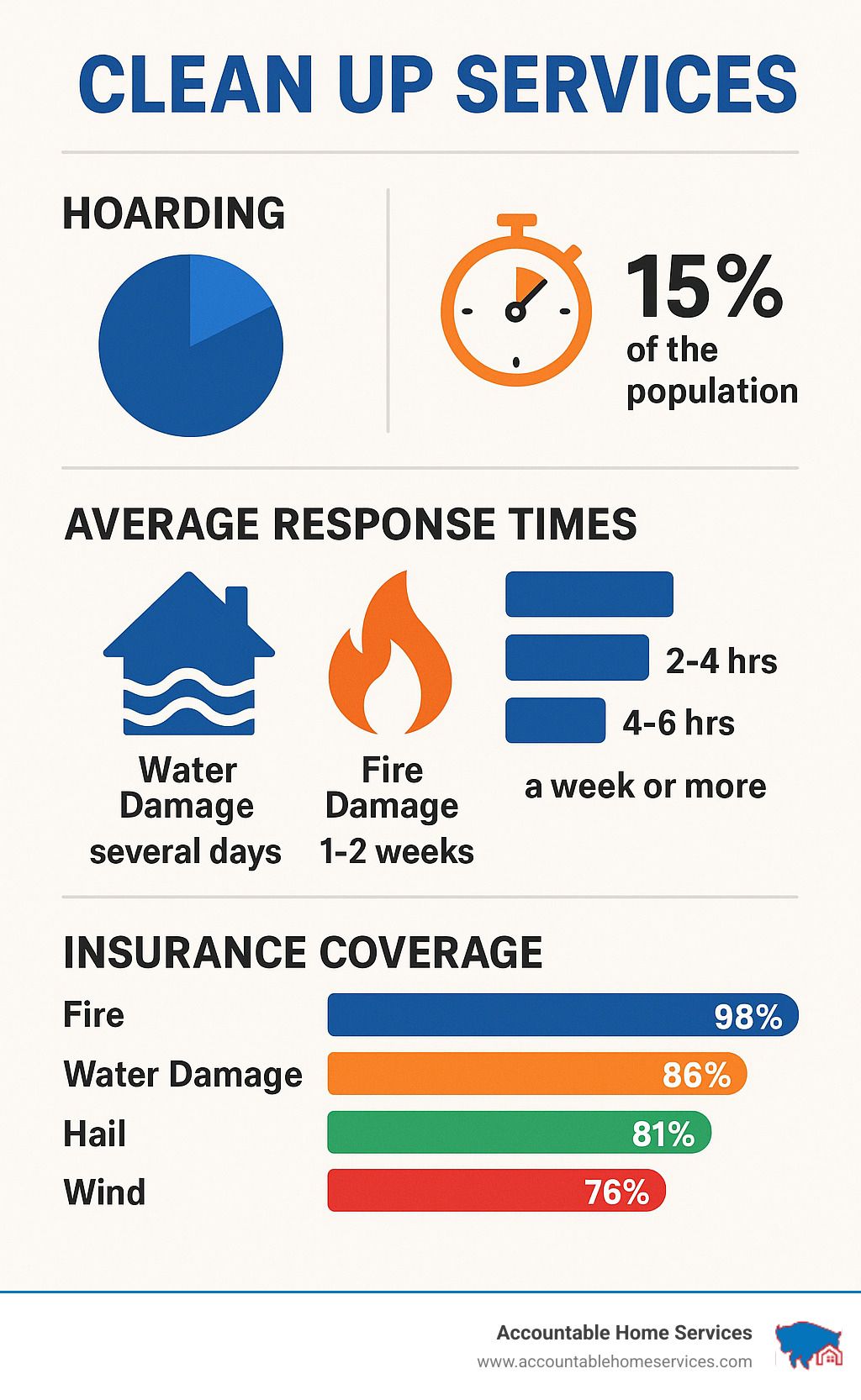
Choosing the Right Clean Up Service Provider
Finding the right clean up services provider during an emergency feels overwhelming, but knowing what to look for can save you from costly mistakes and additional stress. The company you choose will be working in your home during one of your most vulnerable moments, so it's crucial to select a team you can trust completely.
Local reputation tells you everything you need to know about how a company treats its customers. Check online reviews across Google, Yelp, and the Better Business Bureau, but don't stop there. Ask neighbors, friends, and local property managers about their experiences. Companies with strong community ties have more at stake in maintaining their reputation than distant franchises.
When disaster strikes at 2 AM on a Sunday, you need 24/7 availability that's real, not just an answering machine. Call the emergency line yourself to see who actually answers. Professional companies staff their emergency lines with qualified personnel who can dispatch crews immediately, not just take messages for Monday morning callbacks.
Certified technicians make the difference between proper restoration and expensive do-overs. Look for current IICRC certifications specific to your situation—water damage restoration, fire cleanup, or mold remediation each require different specialized training. Don't be shy about asking to see certification cards; legitimate technicians are proud to show their credentials.
Transparent pricing should never feel like a guessing game. Professional companies provide detailed written estimates after thorough inspections, explaining exactly what work will be performed and why it's necessary. If someone gives you a verbal estimate or seems reluctant to put anything in writing, keep looking.
The equipment quality often separates true professionals from well-meaning amateurs. Industrial-grade extraction pumps, thermal imaging cameras, and commercial dehumidifiers represent significant investments that demonstrate a company's commitment to doing the job right. You'll hear the difference when their equipment arrives.
Satisfaction guarantees show a company stands behind its work. Understand what's covered, how long guarantees last, and what happens if issues arise later. Companies confident in their abilities offer meaningful warranties without hesitation.
Service area coverage affects both response times and costs. Choose companies with local presence rather than those traveling hours to reach you. Local companies arrive faster and understand Denver's unique climate challenges that affect restoration work.
Questions to Ask Before Signing the Contract
Before signing any contract for clean up services, have an honest conversation about expectations and procedures. Response time commitments should be specific—"as soon as possible" isn't good enough when water is damaging your home by the hour. Ask about typical arrival times and how they handle scheduling conflicts during busy periods.
Disposal methods matter more than most homeowners realize. Where will contaminated materials go? Are disposal costs included in the estimate? How does the company ensure compliance with local regulations? These details affect both your costs and legal liability.
Certification verification takes just a few minutes but protects you from unqualified workers. Ask for insurance certificates and don't hesitate to call the insurance company directly to verify coverage. Worker injuries or property damage during cleanup could become your responsibility if the company lacks proper insurance.
Aftercare services separate good companies from great ones. What happens if moisture readings aren't quite right? Do they provide follow-up inspections? How do you reach them if concerns arise after the work is complete? Understanding post-completion support prevents future headaches.
Reference checks from recent similar projects give you real insight into company performance. Professional companies readily share customer contacts and encourage you to call. If they hesitate or make excuses, that tells you something important.
For comprehensive fire and water damage information, visit our Fire and Water Damage Repair services.
Red Flags & How to Avoid Costly Mistakes
Some warning signs should immediately disqualify any clean up services provider from consideration. No proof of insurance represents the biggest red flag—you could become liable for worker injuries or property damage if something goes wrong. Never hire anyone who can't provide current insurance certificates immediately.
Cash-only payment demands usually indicate unlicensed operators trying to avoid taxes or regulatory oversight. Professional companies accept multiple payment methods and work directly with insurance companies when possible. They understand that most homeowners don't keep thousands of dollars in cash lying around.
Vague work descriptions make it impossible to hold companies accountable for completing agreed-upon work. Estimates should detail specific tasks, materials, and timelines. If they can't explain exactly what they'll do, how can you trust them to do it properly?
High-pressure sales tactics or demands for immediate decisions suggest companies more interested in quick profits than quality service. Legitimate emergency work requires immediate action, but contract details can usually wait until you've had time to review everything carefully.
Lack of proper safety equipment during initial inspections reveals poor safety practices that likely extend throughout their operations. Professional technicians always use appropriate protective equipment when assessing contaminated properties—it protects both them and your family.
Missing written warranties leave you without recourse if problems develop later. Professional companies stand behind their work with clear, written guarantees that specify exactly what's covered and for how long. Verbal promises disappear when problems arise months later.
Trust your instincts during this process. If something feels wrong or too good to be true, it probably is. The right clean up services provider will make you feel confident and supported during a difficult time, not pressured or confused.
Frequently Asked Questions about Clean Up Services
How fast can a crew arrive in an emergency?
When disaster strikes your home, every minute counts. That's why clean up services prioritize rapid emergency response to minimize damage and protect your property. In the Denver Metro area, most professional teams aim to arrive within 2-4 hours for water emergencies and provide same-day response for fire damage situations.
Response times can vary based on several practical factors. Geographic location plays a significant role—if you're in downtown Denver, crews typically arrive faster than if you're in a more remote mountain community. Time of day also matters, though truly professional companies maintain 24/7 staffing rather than just answering services.
Weather conditions can complicate response times, especially during Colorado's notorious spring storms that cause multiple emergencies simultaneously. When half the neighborhood has flooded basements, crews must prioritize the most severe situations first. Damage severity determines priority—if there's immediate danger to people or major structural threats, you'll move to the front of the line.
Equipment availability sometimes affects timing for large-scale disasters requiring specialized gear. However, established companies maintain sufficient equipment inventory to handle typical emergency volumes without significant delays.
When you call for emergency clean up services, reputable companies provide realistic arrival estimates and keep you updated if circumstances change. They understand that uncertainty adds stress to already difficult situations, so clear communication becomes part of their emergency response protocol.
Are clean up services covered by homeowners insurance?
Insurance coverage for clean up services can feel like navigating a maze, but understanding the basics helps you make informed decisions during stressful times. Most homeowners insurance policies cover sudden, accidental damage while excluding gradual deterioration or maintenance-related issues.
Typically covered situations include burst pipes that flood your basement overnight, fire and smoke damage from electrical problems, wind and hail damage from severe storms, and cleanup after vandalism or theft. Many policies also cover mold remediation when it results from covered water damage—the key phrase being "covered water damage."
Common exclusions include flood damage from external water sources, which requires separate flood insurance through FEMA. Gradual leaks that develop over time, mold from humidity or poor ventilation, and sewage backup often fall outside standard coverage unless you've purchased additional endorsements.
Professional clean up services companies often work directly with insurance adjusters, which benefits everyone involved. They understand policy language, provide detailed documentation that adjusters need, and can bill insurance companies directly for covered services. This arrangement reduces your upfront costs and streamlines the claims process.
Timing matters significantly with insurance claims. Most policies require immediate notification of damage and prompt action to prevent additional problems. Waiting too long to call professionals can actually void coverage for secondary damage like mold growth. Insurance companies expect you to act reasonably to minimize losses, which usually means calling professional help quickly.
Can technicians save sentimental items during the process?
One of the most heartbreaking aspects of property damage involves potentially losing irreplaceable personal belongings. Professional clean up services understand that a child's artwork or grandmother's jewelry holds value far beyond any price tag, which is why experienced teams prioritize salvaging sentimental items whenever safely possible.
Modern restoration techniques can work miracles on items that appear completely ruined. Freeze-drying technology can restore water-damaged photographs and important documents, even when they've been soaked for days. Ultrasonic cleaning gently removes contaminants from electronics and delicate items without causing additional damage.
Specialized cleaning methods include ozone treatment for removing odors from fabrics and furniture, HEPA vacuuming for smoke and soot removal, and antimicrobial treatments for items exposed to contamination. Professional teams often maintain climate-controlled storage facilities for items requiring extended restoration time.
The process begins with careful documentation—technicians photograph potential valuables before any disposal decisions and secure items safely during active cleanup work. They coordinate with families to identify priority items and explain realistic restoration possibilities for different types of damage.
Safety always comes first, however. Items contaminated with sewage, dangerous chemicals, or extensive mold growth may require disposal despite sentimental value. Professional technicians make these difficult decisions based on health risks rather than emotional attachment, but they explain their reasoning clearly and compassionately.
Communication throughout the process helps families understand what's happening to their belongings. Reputable clean up services provide regular updates on salvage efforts and involve homeowners in decisions about which items receive priority attention. This collaborative approach helps families feel more in control during overwhelming situations.
Conclusion
Life has a funny way of testing us when we least expect it. One moment you're enjoying a quiet evening at home, and the next you're standing ankle-deep in water wondering how your basement turned into an indoor swimming pool. These moments remind us why professional clean up services aren't just helpful—they're absolutely essential for protecting everything we've worked so hard to build.
Throughout Denver and the surrounding metro area, families face these challenges daily. Whether it's spring snowmelt flooding basements in Westminster, fire damage from electrical issues in Boulder, or mold findies in Thornton attics, disaster doesn't follow a convenient schedule. That's exactly why having access to professional clean up services with 24/7 emergency response can make all the difference between a manageable crisis and a devastating loss.
The investment in immediate professional response typically pays for itself many times over. Rapid response minimizes damage and reduces long-term costs, while specialized equipment achieves results that household tools simply can't match. Professional teams bring safety protocols that protect your family from health hazards, insurance expertise that maximizes your coverage, and perhaps most importantly, emotional support during some of life's most overwhelming moments.
We've seen too many situations where well-meaning homeowners tried to handle cleanup themselves, only to find weeks later that hidden moisture led to extensive mold growth or that improper disposal methods violated local regulations. These delays can transform a manageable restoration into a major reconstruction project—not to mention the potential for insurance claim denials when secondary damage could have been prevented.
When choosing a cleanup service provider, your family's safety and your property's future depend on making the right choice. Look for local reputation built over years of community service, certified technicians with current IICRC credentials, and transparent pricing that explains exactly what you're getting. Most importantly, trust your instincts—if something feels off about a company's approach, it probably is.
At Accountable Home Services, we understand that behind every emergency call is a family dealing with stress, uncertainty, and often grief. That's why we've built our approach around not just technical expertise, but genuine care for the people we serve. Our certified technicians use cutting-edge equipment and follow strict safety protocols, but they also understand that your grandmother's photo albums might be more valuable than your expensive electronics.
We work directly with insurance companies because we know that financial stress is the last thing you need during an already difficult time. Our 24/7 emergency response means you'll never face a crisis alone, and our commitment to transparent communication ensures you'll always know what's happening and why.
Whether you're dealing with a burst pipe that's turned your finished basement into a disaster zone, smoke damage that's made your home unlivable, or a mold problem that's affecting your family's health, help is just a phone call away. For specialized sewage cleanup situations, our Sewage Cleanup services provide the expertise and discretion these sensitive situations require.
Don't let life's unexpected messes define your story. At Accountable Home Services, we're not just your cleanup crew—we're your neighbors, your partners, and your advocates through every step of the restoration process. We're here 24/7 to turn what feels like an overwhelming disaster into a successful restoration story that brings your home back to life.
Contact Accountable Home Services today—because when life gets messy, you deserve a team that cares as much about your home as you do.

